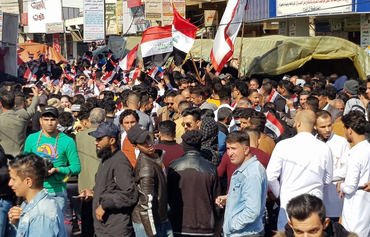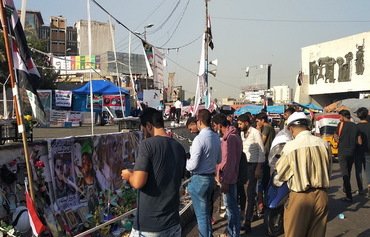Ongoing demonstrations in Iraq and recent violence against protestors that has been linked to Iran-backed militias have further unified Iraqis' resolve for change and their opposition to Iran's "tails", officials and researchers said.
One protestor was killed January 27th in al-Nasiriyah, a medic told AFP, as gunmen stormed the square where demonstrators had been camped out.
The unidentified gunmen arrived in the city's al-Habboubi square just after midnight, torching the tents where protestors had been sleeping.
They fired on protestors, killing one and wounding four, a medical source said.
![Iraqi protesters in al-Nasiriyah's al-Habboubi Square on January 29th. [Alaa Hussein/Diyaruna]](/cnmi_di/images/2020/02/06/22193-protests-habboubi-square-600_384.jpg)
Iraqi protesters in al-Nasiriyah's al-Habboubi Square on January 29th. [Alaa Hussein/Diyaruna]
The main protest camp in Najaf also was burned down by unidentified gunmen.
Observers pointed the finger at Iran-backed militias, who they accuse of being behind the kidnapping and intimidation of activists and journalists.
These militias also were behind attacks on demonstrations in Basra and Karbala, they said.
Isolating Iran-backed militias
Iraqis are now "well aware" that the Iran-backed militias are "an isolated group", Iraqi affairs expert Ali Fadhil al-Lami told Diyaruna.
"Militiamen, especially those with Iranian connections such as Kataib Hizbullah, Harakat al-Nujaba, Asaib Ahl al-Haq, among others, are unwelcome in Iraqi society," he said.
Iraqis accuse these militiamen "of being disloyal to Iraq and working against demonstrators" in their quest to rid the country of corruption, he said.
"They also are seen as responsible for the proliferation of unlicensed weapons and defying the government," al-Lami said. "The term 'tails' means they are supporters of Iran, which is why their isolation is continuing day after day."
Since the defeat of the "Islamic State of Iraq and Syria" (ISIS), Iran-backed militias have become "a primary threat to Iraq's security", al-Lami said.
Iraqis have taken to various social media platforms to report on the malign behaviour and actions of these militias, he said, as these platforms "allow for more freedom of expression than people might find offline".
Iraqis support army, police
"Iraqis only want their national army and police force, and their allegiance lies exclusively with their country," said Ahmed Hamza al-Nasiri, an activist camping out at al-Habboubi square.
This is not the case with militiamen, who have "sold themselves as mercenaries", he told Diyaruna.
"We cannot agree with them on anything, as they serve Iran and are benefiting from the riches of Iraq at the same time," he said. "Whoever does that will eventually betray their own friends and neighbours, which is why there is no trust."
This in turn isolates militiamen from their compatriots, he said, "as they cannot even share in the joys and sorrows of their fellow Iraqis".
Iraqis are unwilling to have friendly relations with militias who consider newly appointed Islamic Revolutionary Guard Corps Quds Force (IRGC-QF) commander Esmail Qaani to be their leader, he said.
Militias hostile to Iraqi interests
"Iraqis want a state comprised of respectable and strong institutions, security and justice, rather than chaos, proliferation of unlicensed weapons and militias," Iraqi MP Luis Caro told Diyaruna.
A state of chaos "is incompatible with the building of a safe nation for them and their children", he said.
Choosing a strong state will naturally isolate Iran-backed militias, who will only become more isolated "as long as members of these militias continue to serve people other than their countrymen", said politician Abbas al-Lafi.
"A free civil state cannot be built in the shadow of militias that pledge their allegiance to another country," he told Diyaruna.
"So now the Iraqi people are strengthening their support of the national army and the militias feel unwanted and, as a result, have become more hostile," he said.
Al-Lafi predicted that this social isolation will result in more militiamen laying down their arms and returning to the fold as civilians who reject acts of aggression towards their compatriots.
Former Iraqi MP Mithal al-Alousi questioned the role of Iran-backed militias, which he said are hostile to Iraqi demonstrators, threaten the security of the country and defy the state's authority.
"They serve Iran rather than Iraq," he told Diyaruna.
For that reason alone, he said, "it is only natural for the Iraqi people to push them out of society and reject them".

![Iraqi protestors in al-Nasiriyah on January 29th chant national slogans and demand that Iran stop interfering in Iraqi affairs. [Alaa Hussein/Diyaruna]](/cnmi_di/images/2020/02/06/22192-iraqi-protests-nasriya-600_384.jpg)






